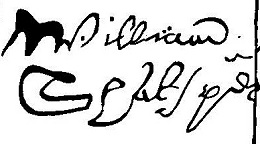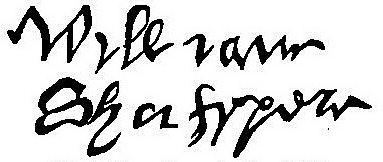| directory |
| home | contact |
|
|||||||||||||||
| search | |||||||||||||||
Playing Fast and Loose with Shakespeare's NameThe Elizabethans cared as little for spelling as they did for the Spanish and nowhere is their comical disregard for simple consistency more evident than in their treatment of the surname Shakespeare. The misspellings were most egregious before Shakespeare's birth and during his youth, with colorfully bizarre variations found in registers and other legal documents of the time. These include Shakesspere, Shakysper, Shaxpeer, Schakespeire, Shackper, Shexpere, Shaxkspere and Shakspeyre.1During Shakespeare's career as actor and dramatist variations seemed to have had decreased considerably, and on many documents concerning Shakespeare's land deals and theatrical company patents the name is spelled Shakespere, although Shakspeare, Shakspere, Shackspeare and Shakespeare also appear, often with multiple spellings occurring within the same document. It appears that Shakespeare cared just a little bit more than his contemporaries about the spelling of his name but, given the careless penmanship, one could deduce that scribbling his John Hancock was an outright nuisance. Four documents contain Shakespeare's authentic signature a total of six times, but the spelling is open to debate in each case. The documents are as follows: (1) a deposition in the suit of Bellott versus Mountjoy (1612); (2) the deed of sale of a house in Blackfriars, London (1613); (3) the mortgage-deed for the house in Blackfriars (1613); (4) Shakespeare's three page Last Will and Testament (1616), with his signature at the foot of each page. The most common interpretations 2 of the signatures are (1) Willm Shakp 
(2) William Shaksper 
(3) Wm Shakspe 
(4) William Shakspere 
(5) Willm Shakspere (6) By me William Shakspeare 
It seems that Shakespeare had a slight preference for Shakspere, but it is truly impossible to tell. So how then did we arrive at our universally accepted modern spelling of his name? The answer lies in two of Shakespeare's long poems and in the posthumous folio collection of his plays in 1623. The poems, Venus and Adonis and Lucrece are unique in that Shakespeare seems to have been involved personally in the registering and proofreading of these two texts at a time when dramatists had no interest in seeing their works published 3. Both poems contain a dedicatory epistle to his wealthy patron, the Earl of Southampton, and conclude "Your Honour's in all duty, William Shakespeare." and "Your lordship's in all duty, William Shakespeare.", respectively. The relationship with his patron seems to have been one of deep importance, and it seems logical that if Shakespeare ever had a desire for autograph accuracy, it would be in the dedications to Southampton. The First Folio was printed seven years after Shakespeare's death with the involvement of Shakespeare's friend and noted poet, Ben Jonson. In previous works Jonson stands out as having used consistently the spelling Shakespeare (sometimes Shake-speare) when listing him as a principal actor in his plays (see Every Man in his Humour and Sejanus) and it is probable that Jonson expressed his preference to the printers of the First Folio, Heminge and Condell. Or perhaps their decision was based on the importance of the Southampton dedications. In any case, the First Folio soon became the standard for the spelling of his name and remained so until the eighteenth century, when editors rebelled and almost uniformly began using Shakspeare for no apparent reason until about 1840. (Theobald and Steevens being two of the notable exceptions). One editor, Thomas Bowdler, who is famous for his censored volumes of Shakespeare's plays, couldn't even agree with himself on the issue. He titled his first edition The Family Shakespeare, "but in his second edition (1820), besides removing 'those words and expressions which cannot be with propriety read aloud in a family,' he dropped the e from the first syllable of the dramatist's name." 4 By the mid-nineteenth century things were back on track and although some tenacious editors retained Shakspere or, in a few instances, Shakspeare, the modern spelling of Shakespeare's name was here to stay. _________ FUN FACT: The term "fast and loose" was the name of an Elizabethan game. Shakespeare and his contemporaries loved the phrase as much as we do and the Bard is often credited with its modern usage. Here is just one example, from Shakespeare's King John: Play fast and loose with faith? so jest with heaven, Make such unconstant children of ourselves, As now again to snatch our palm from palm, Unswear faith sworn, and on the marriage-bed Of smiling peace to march a bloody host, And make a riot on the gentle brow Of true sincerity? (3.1) _________ Notes 1. See French, p. 245 for an expanded list. 2. Thompson, p.4 3. Please see my article, Publishing in Elizabethan England, http://www.shakespeare-online.com/biography/shakespeareinprint.html (Aug. 2000) 4. Haney, p.41 How to cite this article: Mabillard, Amanda. Playing Fast and Loose with Shakespeare's Name. Shakespeare Online. 20 July. 2011. (date when you accessed the information) < http://www.shakespeare-online.com/biography/shakespearename.html >.References French, George Russell. Shakspeareana Genealogica: Part I. London: Macmillan and Co., 1869. Haney, John Louis. The name of William Shakespeare; a study in orthography. Philadelphia: The Egerton press, 1906. Thompson, Sir Edward. Shakespeare's Handwriting. Oxford: Clarendon Press, 1916. Wellstood, Fred (compiler). Shakespeare's birthplace: a catalogue of an exhibition of original documents of the XVIth & XVIIth centuries. Stratford-upon-Avon: Edward Fox & Son, 1916. Wise, George. The Autograph of William Shakespeare. Philadelphia: P.E. Abel, 1869. _________ Related Articles
|
|
©1999-2021 Shakespeare Online. All Rights Reserved.